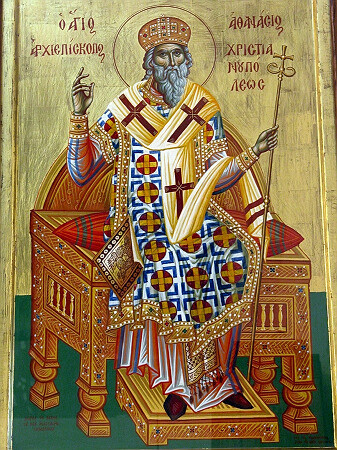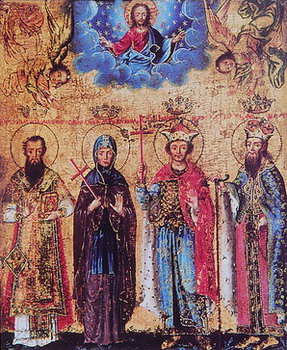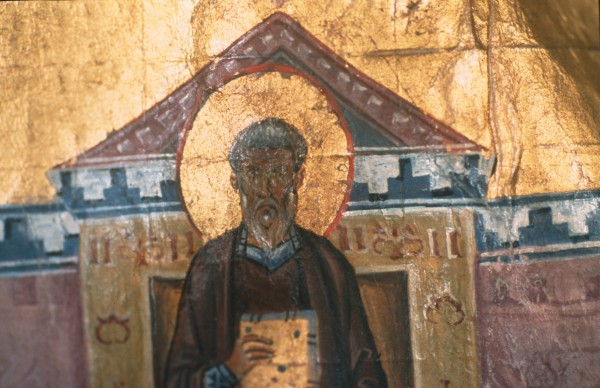|
|
St Athanasius the Great, Archbishop of Alexandria Born in Alexandria in 296, he had from childhood an inclination to the spiritual life. He was a deacon with Archbishop Alexander and accompanied him to Nicaea, to the First Ecumenical Council in 325. At this Council, Athanasius became famed for his learning, his devotion and his zeal for Orthodoxy, and contributed very greatly to the containing of the Arian heresy and the strengthening of Orthodoxy. After the death of Alexander, Athanasius was chosen as Archbishop of Alexandria. He remained in his archiepiscopal calling for more than forty years, although he was not on the archiepiscopal throne the whole time. He was persecuted by heretics through almost the whole of his life, particularly by the Emperors Constantius, Julian and Valens, by Bishop Eusebius of Nicomedia and many others, and by the heretic Arius and his followers. He was forced to hide from his persecutors in a well, a grave, private houses and the deserts. Twice he was forced to flee to Rome. Only just before his death did he have a peaceful period as a good shepherd with his flock, which truly loved him. There are few saints who have been so callously slandered and so criminally persecuted as St Anthanasius. But his great soul endured all with patience for the love of Christ and at last emerged victorious from all these terrible and lengthy struggles. He often went to St Antony for advice and moral support, revering him as his spiritual father. He suffered greatly for the truth, until the Lord gave him rest in His kingdom as His faithful servant, in the year 373. Born in Alexandria in 296, he had from childhood an inclination to the spiritual life. He was a deacon with Archbishop Alexander and accompanied him to Nicaea, to the First Ecumenical Council in 325. At this Council, Athanasius became famed for his learning, his devotion and his zeal for Orthodoxy, and contributed very greatly to the containing of the Arian heresy and the strengthening of Orthodoxy. After the death of Alexander, Athanasius was chosen as Archbishop of Alexandria. He remained in his archiepiscopal calling for more than forty years, although he was not on the archiepiscopal throne the whole time. He was persecuted by heretics through almost the whole of his life, particularly by the Emperors Constantius, Julian and Valens, by Bishop Eusebius of Nicomedia and many others, and by the heretic Arius and his followers. He was forced to hide from his persecutors in a well, a grave, private houses and the deserts. Twice he was forced to flee to Rome. Only just before his death did he have a peaceful period as a good shepherd with his flock, which truly loved him. There are few saints who have been so callously slandered and so criminally persecuted as St Anthanasius. But his great soul endured all with patience for the love of Christ and at last emerged victorious from all these terrible and lengthy struggles. He often went to St Antony for advice and moral support, revering him as his spiritual father. He suffered greatly for the truth, until the Lord gave him rest in His kingdom as His faithful servant, in the year 373.St Maxim, Archbishop of Wallachia Son of the Serbian despot Stefan the Blind and his wife Angelina, he received the monastic habit in the monastery of Manasija. Having pressure put on him by the Turks, he fled into the mountainous part of Romania, where he was consecrated to the vacant archiepiscopal see of Wallachia. He reconciled the disputing military commanders Radul and Bogdan and averted war between them. He returned to Krusedol in his last years, founded a monastery there and, after great spiritual endeavour, entered into rest on January 18th, 1516. His uncorrupt and wonder-working relics lie even to this day in that monastery. Son of the Serbian despot Stefan the Blind and his wife Angelina, he received the monastic habit in the monastery of Manasija. Having pressure put on him by the Turks, he fled into the mountainous part of Romania, where he was consecrated to the vacant archiepiscopal see of Wallachia. He reconciled the disputing military commanders Radul and Bogdan and averted war between them. He returned to Krusedol in his last years, founded a monastery there and, after great spiritual endeavour, entered into rest on January 18th, 1516. His uncorrupt and wonder-working relics lie even to this day in that monastery.Martyr XeniaMartyr by fire.
St. Ephraim the Lesser, the PhilospherToday little is known about the life of venerable Ephraim the Lesser, the great 11th-century writer, translator, philosopher, and defender of the Georgian Church. His work Reminiscences and other sources, however, provide us with the means to speculate about the major periods of his life and labors.
In 1027, when King Bagrat IV (1027–1072) ascended the Georgian throne, many noblemen of the Tao region in southern Georgia relocated to Greece. Among them was the honorable Vache, son of Karichi, whom scholars believe was Ephraim’s father.
After receiving a Greek education in Constantinople, Ephraim settled in the Black Mountains near Antioch and began his labors there. His achievements in Georgian theological and philosophical writing are immeasurable. The number of his works is almost one hundred, and the subjects cover nearly every branch of theological inquiry. Ephraim even developed his own theory of translation, which later formed the foundation for written composition in the Georgian language. His theory consists of three essential points:
1. A composition must be translated from the original, that is, from the language in which it was first written.
2. The translation must carry the same literal meaning as the original, but accuracy in this regard must not violate the nature of the language into which the text is being translated.
3. A section of commentary that examines all relevant historical, grammatical, and literary issues should be included with the translated text.
Ephraim translated five of the works of St. Dionysius the Areopagite, The Ascetic Rules of St. Basil the Great, the writings of St. Ephraim the Syrian, commentaries on the Epistles and Psalms, and many other important patristic writings.
Among Ephraim the Lesser’s original works, his most significant is An Explanation of the Reasons for the Conversion of Georgia, a compilation of existing essays and his own commentaries on the nation’s conversion.
In the second half of the 11th century, the monks of Antioch and the Black Mountains began to deny the independence of the Georgian Church. Among other claims, they argued that none of the Apostles had preached the Christian Faith in Georgia. It became necessary to prove that the Georgian Church was indeed autocephalous, and members of the nation’s elite accordingly called upon Ephraim to settle this issue. Ephraim studied many patristic writings in the original Greek, gathered the ancient sources, and succeeded in fully securing the independent existence of the Georgian Church.
St. Ephraim wrote the following about the Apostles’ preaching: “Know that from the time the Apostles were preaching, according to the Prophet David: Their voice was heard through all the earth, and their words resounded in every village (c.f. Ps. 18:4). In Georgia, Andrew the First-called preached the Gospel in Avazgia (now Abkhazeti), and from there he journeyed to Ossetia (now Shida Kartli). Bartholomew also preached in Georgia, in the Kartli region.”
St. Ephraim never left the Black Mountains. In 1091 he was enthroned as the abbot of Kastana Monastery (The precise location of Kastana is unknown, but according to modern archaeologists, it was probably in the Black Mountains. For a full discussion of the subject see: Wachtang Z. Djobadze, Materials for the study of Georgian monasteries in the Western environs of Antioch on the Orontes (Louvain: Corpus Scriptorum Christianorum Orientalium, 1976), pp. 101–3)
Our holy father Ephraim reposed in the Lord around the year 1101. He is included in a list of the departed compiled by the Council of Ruisi-Urbnisi in 1103, and the year of his death has been approximated from the information given in this source.
Ephraim was canonized by the Orthodox Church of Georgia because of his God-pleasing life and the many commendable works he performed on behalf of the Church and his nation.
Venerable Marcian of Cyrrhus in Syria Saint Marcian of Cyrrhus lived in the desert near the city of Cyrrhus. He built a small hut and settled in it, passing his time in prayer, singing Psalms and reading spiritual books. He ate very little food, just enough to keep him alive. Reports of his holy life attracted to him many zealous ascetics, and St Marcian established a monastery for them.
God’s blessing rested upon the saint, and he possessed the gift of wonderworking. Once, a serpent crawled into his cell. The saint made the Sign of the Cross and the serpent perished, burned up by flames. At night, when the ascetic read, a heavenly light shone for him. The monk also worked many other miracles on behalf of the brethren. He died in peace about the year 388. Saint Marcian of Cyrrhus lived in the desert near the city of Cyrrhus. He built a small hut and settled in it, passing his time in prayer, singing Psalms and reading spiritual books. He ate very little food, just enough to keep him alive. Reports of his holy life attracted to him many zealous ascetics, and St Marcian established a monastery for them.
God’s blessing rested upon the saint, and he possessed the gift of wonderworking. Once, a serpent crawled into his cell. The saint made the Sign of the Cross and the serpent perished, burned up by flames. At night, when the ascetic read, a heavenly light shone for him. The monk also worked many other miracles on behalf of the brethren. He died in peace about the year 388. |